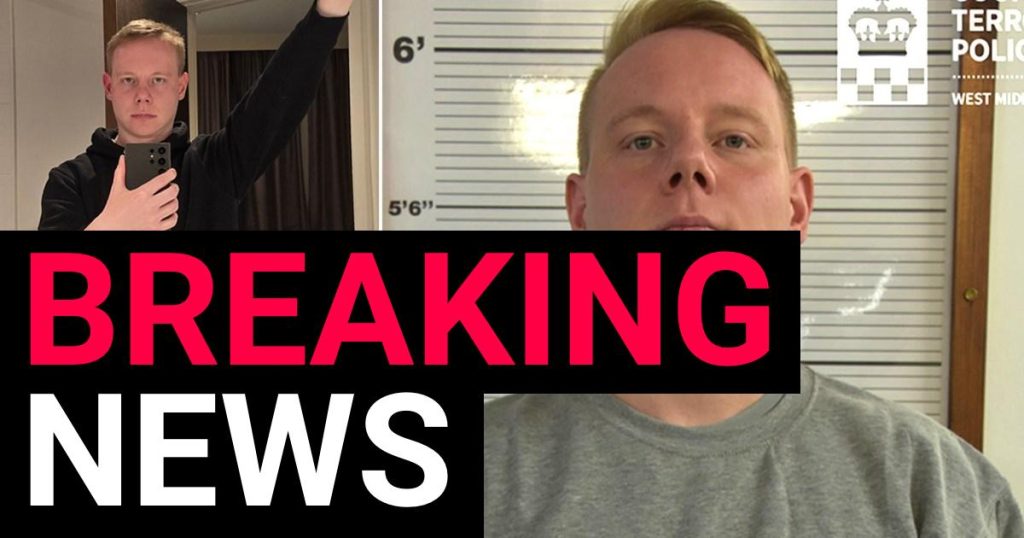Paragraph 1: The Crime and Conviction
Callum Parslow, a 32-year-old neo-Nazi, has been sentenced to life imprisonment for the attempted murder of an asylum seeker. Parslow, driven by his extremist ideology, meticulously planned the attack, traveling four and a half miles to the Pear Tree Inn in Hindlip, Worcestershire, armed with a specialized knife purchased online for £770. His target, Nahom Hagos, an Eritrean asylum seeker, was enjoying a meal in the hotel conservatory when Parslow approached him, inquired about his origin, and then launched a brutal attack, stabbing Hagos in the chest and hand. The court, presided over by Mr. Justice Dove, deemed Parslow’s actions a terrorist attack motivated by his deeply ingrained far-right, neo-Nazi beliefs, and handed down a minimum term of 22 years and eight months.
Paragraph 2: The Manifesto and Ideological Motivation
Parslow’s extremist ideology was laid bare through his self-authored “terrorist manifesto,” which he attempted to disseminate via Twitter. The manifesto, addressed to prominent political figures including Sir Keir Starmer, Rishi Sunak, Nigel Farage, and Suella Braverman, as well as far-right personalities like Tommy Robinson, articulated Parslow’s hateful views. He railed against what he perceived as "the evil enemies of nature and of England," identifying "the Jews, the Marxists and the Globalists" as responsible for the supposed decline of Christianity, white people, and European culture. The attempted tweet, which also tagged various news outlets and political figures such as Laurence Fox, Nick Griffin, Donald Trump, and Boris Johnson, failed to send due to the excessive number of recipients.
Paragraph 3: Evidence of Extremist Affiliations
Further solidifying Parslow’s extremist leanings, a police search of his Worcester flat uncovered a collection of disturbing items. Alongside a second knife, an axe, and a metal baseball bat, officers discovered a red armband emblazoned with a swastika, a Nazi-era medallion, and copies of Adolf Hitler’s infamous autobiography, Mein Kampf. Perhaps most chillingly, a tattoo of Hitler’s signature adorned Parslow’s left forearm, serving as a stark visual representation of his allegiance to Nazi ideology. This collection of paraphernalia provided compelling evidence of Parslow’s immersion in and commitment to his extremist beliefs.
Paragraph 4: The Victim’s Account and Parslow’s Reaction
Nahom Hagos, the victim of Parslow’s attack, miraculously survived the stabbing and described his survival as a divine intervention. He recounted the terrifying moment when Parslow, upon learning of his Eritrean heritage, suddenly produced the knife and began his assault. The prosecution emphasized that Parslow’s actions were premeditated and driven by his extreme right-wing ideology, which led him to specifically target Hagos based on his ethnicity. Upon receiving the guilty verdict for attempted murder, Parslow remained impassive, displaying no remorse for his heinous act.
Paragraph 5: Additional Offenses and Plea
Minutes after his conviction for attempted murder, Parslow pleaded guilty to additional offenses committed in the preceding year. These included an incident of intentional indecent exposure, where he sent a video of himself exposing his genitals from a Facebook account. These further offenses paint a picture of a disturbed individual with a history of inappropriate and criminal behavior, adding another layer to the complex profile of this convicted terrorist.
Paragraph 6: The Broader Context and Implications
This case underscores the growing threat of extremist ideologies, particularly far-right extremism and its potential for violence. Parslow’s actions serve as a stark reminder of the dangers of unchecked hate speech and the importance of combating extremist narratives. His targeting of an asylum seeker highlights the vulnerability of marginalized communities to such violence, fueled by prejudice and xenophobia. The severity of the sentence handed down by the court reflects the gravity of the crime and sends a clear message that such acts of terrorism motivated by hate will not be tolerated. The case also raises questions about the role of social media and online platforms in the spread of extremist ideologies and the importance of effective measures to counter these harmful narratives.











